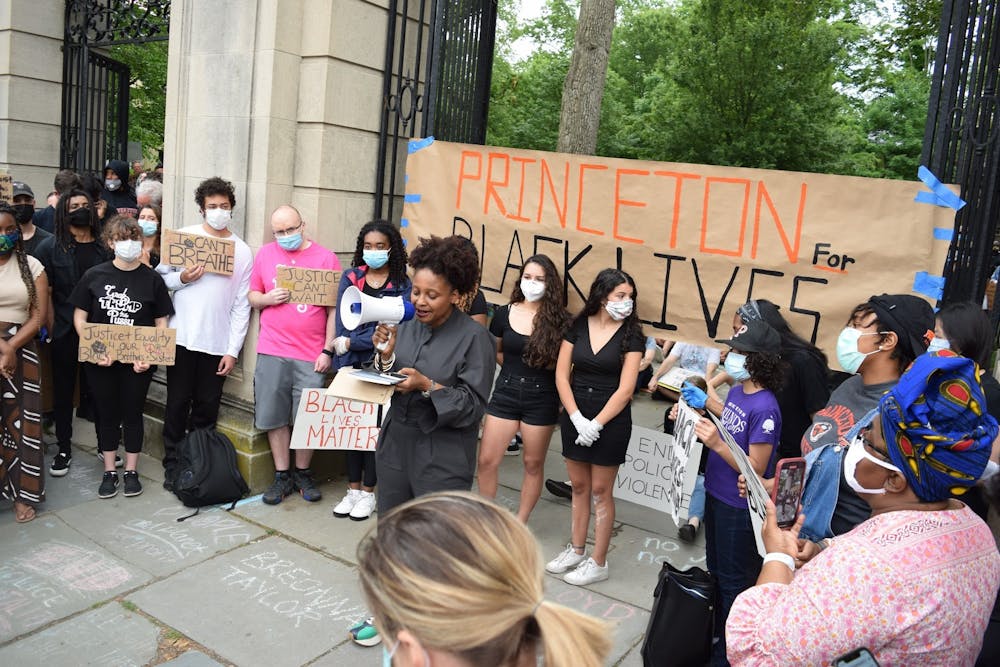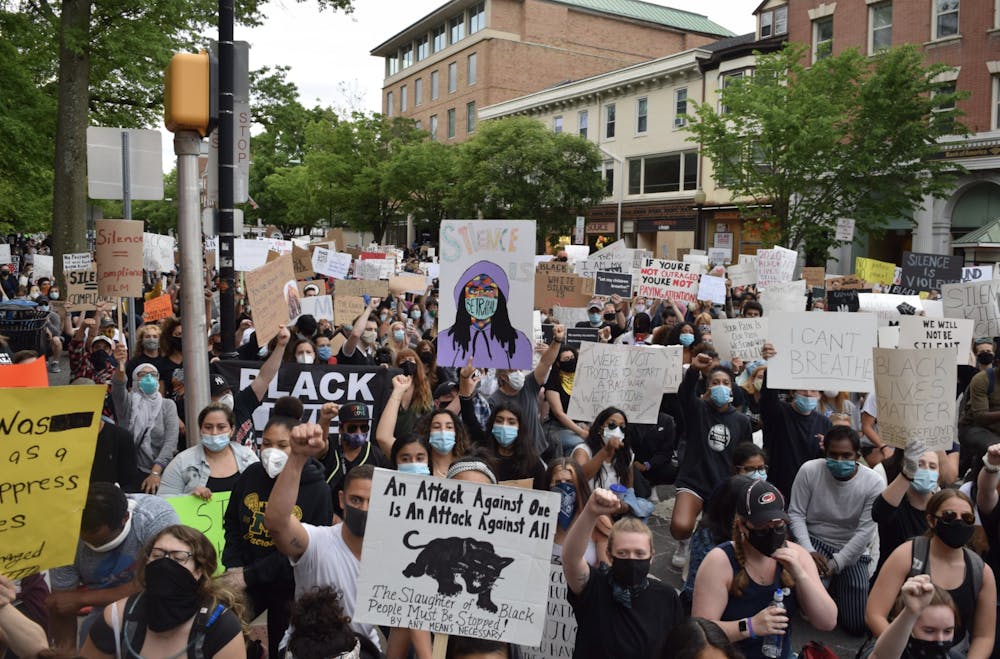Over 1000 protesters gathered outside FitzRandolph Gate on June 2 — chanting, kneeling, and listening — to protest the deaths of George Floyd and other black Americans, especially those at the hands of police.
The protest is one of many that emerged out of last week’s high-profile killing, when Derek Chauvin, a Minneapolis police officer, pressed his knee into George Floyd’s neck for eight minutes and 46 seconds, while three other officers stood by. In the Floyd family’s private autopsy, the death was ruled a homicide by mechanical asphyxia.
The four officers were fired immediately and Chauvin has been charged with third-degree murder and manslaughter. Chauvin had 18 previous complaints against him.
Floyd’s death was caught on camera, and the video has sparked outrage throughout the country. Other videos of police using force against civilians show rising tensions at many protests.
In Princeton, protestors lined Nassau Street and Witherspoon Street to come together for “Justice for George Floyd: Princeton in Solidarity.” The protesters remained entirely peaceful, according to Princeton Police Department’s Sergeant Kim Hodges.
“We've had no incidences of property damage,” she said.
The protest began with demonstrators kneeling for a moment of silence held for eight minutes and 46 seconds, representing the amount of time that Chauvin kept his knee on George Floyd’s neck.
Following the silence, there was a series of speakers, beginning with Imani Mulrain ’23, and including Princeton native Sumiayyah Stephens, Associate Professor of African American Studies Ruha Benjamin, Chair of the Lewis Center for the Arts Tracy K. Smith, and Witherspoon Street Presbytarian Church Reverend Lukata Mjumbe.

Those who spoke at the protest emphasized the frustration of people of color across America.
“The ultimate threat was never COVID, but the licensing of brutality under the guise of law and order. Our country spends 100 billion dollars nationwide on policing,” Benjamin said in her speech. “The fact is, our elected officials have outsourced a long list of social problems to police that they have no business dealing with. From mental illness, to substance abuse, to homeless[ness], to poverty, we have empowered an institution born out of the desire to patrol slaves to handle our social needs.”
The speakers called for systemic change, rather than minor fixes to a broken system.
“We are not going to diversify, train, or tech-fix our way out of this social crisis. Rather we must take the money we would normally invest in police and reinvest it in all the other institutions that we actually need to sustain us,” Benjamin said.

In his speech, Mjumbe discussed the need for students to be active in the movement.
“One of the best universities is raising up some of the smartest, some of the brightest, some of the most talented,” said Mjumbe, in reference to the University. “If their minds are not changed, they will grow up to be some of the greatest oppressors.”
“There’s a difference between keeping the peace and making peace,” he said. “You keep peace with riot shields. You keep peace with armored cars that the Mercer County Commission has purchased … You keep peace with guns. You keep peace with bullets. You keep peace with curfews. You keep peace by holding people down. But when we make peace, it means we all come together.”
Several other protesters explained their reasons for attending.
“In the onslaught of oppression against black communities from health disparities to mental health, redlining, and all the way to modern-day lynchings, it has to end,” said Associate Dean of Religious Life and of the Chapel Dr. Theresa Thames.
She also expressed her wishes for the outcome of the nationwide protest, saying she hopes that “people will not only protest in the streets, but that their daily lives will reflect not just silence and complicity, but activism on every level from their schools to the PTAs to every level of government, every way we live our lives, that we call out racism when we see it.”
Chilly Wallace, a Montgomery, N.J. resident and Oberlin College student said, “I’m here because this is applicable to my daily life. This is something that I have to deal with myself.”
“In the black community, people have PTSD just from dealing with the police, even if they haven’t dealt with it first hand. And a lot of people don’t realize that this matter isn’t just the police, that’s like the tip of the iceberg. This is something we’ve had to deal with for over 400 years — 1619, where the first slave ship came to America.”
Princeton resident Kenneth Davis expressed frustration with policing practices in the community.
“I’m protesting because of course, all black lives matter,“ he said. “With all the recent deaths that have been going on, it’s getting ridiculous, especially with the police being a protective gang out here with no rules and no regulations and no justice for any of their actions … It needs to stop … I want legal recourse for what’s going on, especially having people change it to become the legislation.”

Courtesy of Valeria Torres-Olivares ’22
At the event itself, there were no clashes with police and their presence was mostly felt before the protest began and when two protesters needed medical attention. There were police scanning the crowd on a nearby rooftop.
Sergeant Hodges said she did not know how many police officers were present but explained that the police department sent as many officers as possible to make sure that the protesters were safe.
“We mobilized a number of officers. We made sure that the streets were shut down so that anybody who was in the street and wanted to demonstrate was able to do so safely,” she said.
While protesters did not stand six feet apart as the Facebook event and organizers repeatedly asked, a vast majority of those in attendance wore face masks, cognizant of the looming threat of COVID-19.
Although the police department did not have a clear estimate of how many were in attendance, organizers estimated over 1000 people were present at the protest.
The event was organized in just one day and was sponsored by Not in Our Town, CHOOSE, PHS MSAN, PHS PULSE, Princeton Latinos y Amigos, Labyrinth Books, Princeton YWCA, Code Equal, Housing Initiatives of Princeton, and the Coalition for Peace Action.
The organizers, Valeria Torres-Olivares ’22, Priya Vulchi ’22, Harvard student Winona Guo, Princeton High School students Kyara Torres-Olivares, Reanna Bartels-Quansah, Princeton High School Alum Sumaiyya Stephens, and Gillian Bartels-Quansah released a statement after the event via Facebook, encouraging participants to "remember that their serious commitment to anti-racism — starting with cultivating their own racial literacy — is needed not just today, but also tomorrow."
Benjamin reflected on the impact of the protest in an email to The Daily Princetonian.
“Today I felt *even* deeper admiration for the youth organizers, many of whom I know well, and I felt energized by the number of people who showed up in the midst of a pandemic,” she wrote. “It speaks to the importance and urgency of the issues we are dealing with that so many people felt it was necessary to express solidarity in person. The people united will never be defeated!”








